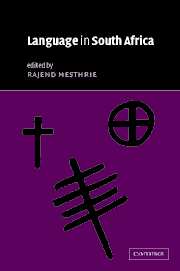Book contents
- Frontmatter
- Contents
- List of maps
- List of contributors
- Acknowledgements
- List of phonetic symbols
- List of abbreviations
- Introduction
- Part I The main language groupings
- 1 South Africa: a sociolinguistic overview
- 2 The Khoesan Languages
- 3 The Bantu languages: sociohistorical perspectives
- 4 Afrikaans: considering origins
- 5 South African English
- 6 South African Sign Language: one language or many?
- 7 German speakers in South Africa
- 8 Language change, survival, decline: Indian languages in South Africa
- Part II Language contact
- Part III Language planning, policy and education
- Index
- References
4 - Afrikaans: considering origins
from Part I - The main language groupings
Published online by Cambridge University Press: 22 September 2009
- Frontmatter
- Contents
- List of maps
- List of contributors
- Acknowledgements
- List of phonetic symbols
- List of abbreviations
- Introduction
- Part I The main language groupings
- 1 South Africa: a sociolinguistic overview
- 2 The Khoesan Languages
- 3 The Bantu languages: sociohistorical perspectives
- 4 Afrikaans: considering origins
- 5 South African English
- 6 South African Sign Language: one language or many?
- 7 German speakers in South Africa
- 8 Language change, survival, decline: Indian languages in South Africa
- Part II Language contact
- Part III Language planning, policy and education
- Index
- References
Summary
INTRODUCTION
The three groups primarily responsible for the formation of Afrikaans – European settlers (from 1652), the indigenous Khoekhoe and enslaved peoples of African and Asian provenance (from 1658) – were quite distinct during the first decades of the Cape Colony. This distinctness was defined by physical appearance, culture, religion and language. By the end of the Dutch East India Company (VOC) era in 1795, a number of processes had eroded these boundaries, inter alia: the incorporation of the Khoekhoe into the European-dominated society as wage-labourers subject to Dutch law; conversion of slaves and free blacks to Christianity or Islam; and miscegenation and intermarriage among groups (cf. Elphick and Shell 1989:184). Descendants of these groups had further come to share in a common vernacular that was unique to southern Africa.
THE NETHERLANDIC DETERMINANTS OF AFRIKAANS
During the VOC era (1652–1795), the language of European settlers in southern Africa reflected not the emerging standard Dutch of the metropole but rather the popular and regional varieties of the rank and file. Kloeke (1950) concluded that the Netherlandic base of Afrikaans must lie in the southern part of the modern province of South Holland. Scholtz (1963:232–56) acknowledged Hollandic affinities, even though he disputed the idea that the metropolitan base could be located in one specific region in Holland. There is reason to believe that Afrikaans has historical links to an inchoate koine that formed in Amsterdam and other urban centres in Holland during the seventeenth century due to internal immigration and an influx of refugees from Germany and French-speaking regions.
- Type
- Chapter
- Information
- Language in South Africa , pp. 79 - 103Publisher: Cambridge University PressPrint publication year: 2002
References
- 23
- Cited by



